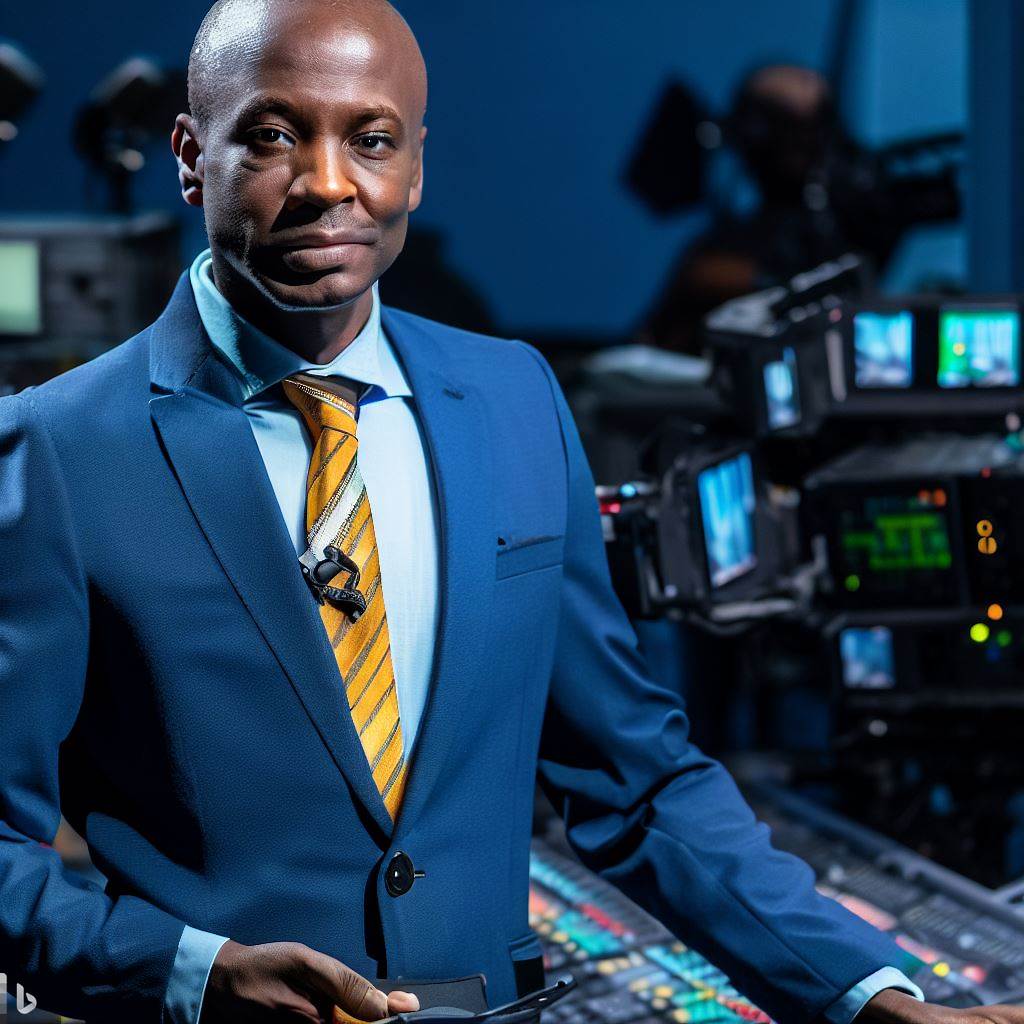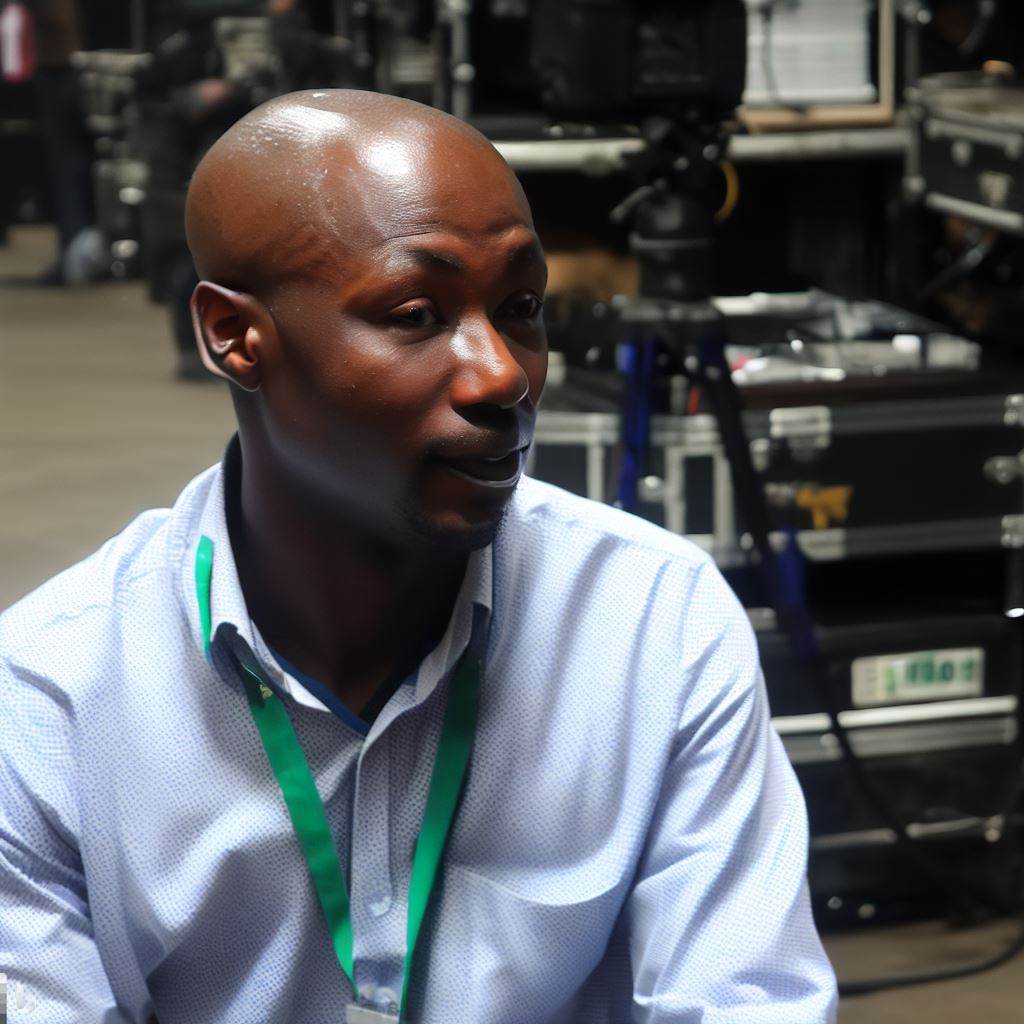Introduction
This blog post aims to compare the responsibilities and tasks of TV Floor Manager in Nigeria vs World TV floor managers.
A TV floor manager plays an essential role in the production of television shows, ensuring smooth operations on set.
TV Floor Manager Role
A TV floor manager is responsible for coordinating everything that happens on the studio floor.
They assist in the smooth running of a TV show, ensuring all elements are executed flawlessly.
Their duties range from cueing live presenters and guests to managing camera positions and overseeing set changes.
Purpose of the Blog Post
This blog post aims to compare how TV floor managers operate in Nigeria compared to other countries.
It will highlight similarities and differences to provide insights into the Nigerian television industry’s unique dynamics.
By understanding the local context, this blog post seeks to showcase the specific challenges and skills required in Nigeria’s TV production industry.
Through this comparison, we can appreciate the role of TV floor managers globally and recognize the value they bring to the television production process.
It will also shed light on the factors that shape their responsibilities and the impact of cultural variations on their tasks.
Basically, TV floor managers are integral to the success of television shows, and this blog post will explore the similarities and differences in their roles in Nigeria and the rest of the world.
TV Floor Manager in Nigeria
Responsibilities of a TV Floor Manager in Nigeria
- Coordinate and direct the activities on the TV studio floor during live broadcasts.
- Ensure smooth transitions between different segments and maintain the flow of the program.
- Manage the floor crew, including camera operators, sound technicians, and floor directors.
- Communicate effectively with the director and other staff members to execute the show’s vision.
- Organize rehearsals and ensure that all technical aspects, such as lighting and set design, are properly set up.
- Ensure the safety of everyone present on the studio floor, including the talent and the crew.
Specific Challenges and Tasks Unique to Nigeria
- Limited resources: TV floor managers in Nigeria often face challenges in terms of equipment availability and maintenance.
- Unreliable power supply: Constant power outages can disrupt live broadcasts, requiring innovative solutions and backup plans.
- Language diversity: With over 500 languages spoken in Nigeria, communication on the studio floor can be challenging if not properly managed.
- Cultural diversity: Nigeria is a culturally diverse country, requiring TV floor managers to understand and incorporate various cultural elements in their shows.
- High audience expectations: Nigerian viewers have high expectations for TV programs, demanding high-quality production values and engaging content.
- Security concerns: Operating in a country with security challenges requires TV floor managers to be vigilant and ensure the safety of the staff and talent.
Cultural and Societal Factors Influencing the Role
- Nigerian entertainment industry: Nollywood, Nigeria’s booming film industry, heavily influences TV production, and floor managers often incorporate elements from Nollywood into their shows.
- Religion: Nigeria is a religiously diverse country, and TV floor managers must be mindful of religious sensitivities, especially during live shows and religious programs.
- Influence of traditional customs: In some regions, traditional customs and cultural practices may impact the programming decisions made by TV floor managers.
- Social issues: Nigeria faces various social issues such as poverty, corruption, and gender inequality, which TV floor managers may address through their programming choices.
Generally, the responsibilities of a TV floor manager in Nigeria involve coordinating and directing live broadcasts, managing the floor crew, and ensuring the safety and smooth running of the program.
They face unique challenges, such as limited resources, unreliable power supply, and diverse cultural and societal factors.
Despite these challenges, TV floor managers in Nigeria play a crucial role in delivering high-quality content to meet the expectations of the Nigerian audience.
Read: Day in the Life: A Nigerian Television Floor Manager
TV Floor Manager in the Rest of the World
TV floor managers play a crucial role in ensuring smooth operations on television sets around the world.
Although their responsibilities may vary depending on the country, there are several similarities and differences in their job descriptions.
Cultural and technological factors also influence the way this role is shaped.
The responsibilities of a TV floor manager in different countries
In the rest of the world, TV floor managers have a range of responsibilities that contribute to the overall production.
They are responsible for coordinating all activities that take place on the studio floor, ensuring that everyone knows their roles and follows the production schedule.
They act as a liaison between different departments, such as the director, camera crew, and production team.
Their primary goal is to maintain clear communication and coordination throughout the production process.
In countries like the United States and the United Kingdom, TV floor managers also have significant responsibilities during live broadcasts.
They are responsible for cueing in presenters and ensuring that everything runs smoothly on set.
Their job includes managing timings, making sure that commercials are aired at the right moments, and handling any technical issues that may arise during the broadcast.
In addition, they often work closely with the director to relay instructions and make necessary adjustments.
Similarities and differences in the job description
In contrast, the role of a TV floor manager in Nigeria may differ in some ways.
Due to the unique cultural context and infrastructure challenges, their responsibilities may extend beyond the standard duties.
In Nigeria, floor managers are not only responsible for coordinating the activities on set but also play a crucial role in crowd control.
They ensure that the audience follows the production guidelines and does not disrupt the shoot.
This additional responsibility highlights how cultural factors can shape the role of a TV floor manager.
How cultural and technological factors may shape the role
Technological factors also play a significant role in shaping the responsibilities of TV floor managers worldwide.
With advancements in technology, floor managers now have to handle complex equipment and coordinate with technical teams.
In countries with access to the latest broadcast technology, floor managers may also be responsible for operating virtual reality or augmented reality elements during production.
These advancements have expanded the scope of their responsibilities and require a deeper understanding of technological processes.
Despite these differences, the core responsibilities of a TV floor manager remain the same across the world.
They are the linchpin of a successful TV production, coordinating the efforts of various departments and ensuring seamless execution.
Whether it is in Nigeria, the United States, or any other country, TV floor managers serve as the backbone of the production team.
Essentially, the role of a TV floor manager may vary from country to country, but there are several similarities and differences in their job descriptions.
Cultural and technological factors shape this role, and additional responsibilities may arise based on the specific context.
Nevertheless, their primary responsibility remains coordinating activities on the studio floor and ensuring smooth production.
Read: Educational Pathways to Become a TV Floor Manager
Skills and Qualifications in Nigeria
To be a successful TV floor manager in Nigeria, certain skills and qualifications are required.
Let’s explore them in detail:
- Strong Communication Skills: A TV floor manager in Nigeria needs excellent verbal and written communication skills to effectively relay information to the production team and ensure smooth operations.
- Leadership Abilities: The role of a TV floor manager demands strong leadership qualities to coordinate and guide the crew, ensuring everyone is on the same page and work is executed efficiently.
- Technical Knowledge: It is essential for a TV floor manager in Nigeria to have a good understanding of technical aspects related to television production, including camera operations and sound setups, to troubleshoot issues effectively.
- Organizational Skills: With the fast-paced nature of TV production, a floor manager must be highly organized and able to handle multiple tasks simultaneously.
- Ability to Work Under Pressure: Nigeria’s television industry can be demanding, and a floor manager must thrive in high-pressure situations, making quick decisions while maintaining composure and professionalism.
- Flexibility and Adaptability: Nigeria’s unique challenges, such as frequent power outages and limited resources, require a TV floor manager to be adaptable and find creative solutions to potential problems.
- Problem-Solving Skills: The ability to think on their feet and resolve unexpected issues swiftly is crucial for a successful TV floor manager in Nigeria.
Specific training or education programs in Nigeria
When it comes to specific training or education programs in Nigeria, individuals aspiring to become TV floor managers can pursue various options.
Some of them include:
- Bachelor’s Degree in Mass Communication: This program provides a comprehensive understanding of media production, journalism, and broadcasting, equipping individuals with the necessary skills for a TV floor manager role.
- Certification in TV Production: Several institutions in Nigeria offer short-term courses in TV production, which focus on technical skills required for roles like floor management.
- Internships and On-the-Job Training: Practical experience gained through internships or entry-level positions in television production allows aspiring floor managers to learn the ropes and develop crucial skills.
Importance of adaptability and problem-solving skills due to Nigeria’s unique challenges
The importance of adaptability and problem-solving skills cannot be overstated in Nigeria’s television industry.
Challenges like erratic power supply and limited equipment availability call for floor managers who can quickly adapt to unforeseen circumstances and find innovative solutions.
In general, to be a successful TV floor manager in Nigeria, one must possess strong communication, leadership, and organizational skills.
Technical knowledge, the ability to work under pressure, and problem-solving capabilities are vital.
Pursuing relevant education programs or gaining practical experience through internships can significantly enhance prospects.
Adaptability and problem-solving skills remain crucial due to Nigeria’s unique challenges in the television industry.
Read: The Evolution of TV Floor Management in Nigeria

Skills and Qualifications in the Rest of the World
In the world of television production, the role of a TV floor manager is crucial.
This individual is responsible for the smooth running of a live television show, ensuring that everything goes according to plan.
While the specific skills and qualifications required for this role may vary from country to country, there are some common traits that are valued universally.
- Communication Skills: TV floor managers need to have excellent communication skills, as they are required to liaise with various departments.
They must be able to convey instructions clearly and efficiently to the production team, including directors, camera operators, and presenters. - Organizational Skills: A TV floor manager must possess strong organizational skills to coordinate all the moving parts of a live production.
They need to have a keen eye for detail, ensuring that everything is in place and ready before the show goes live. - Problem-solving Skills: Live television shows require quick thinking and the ability to troubleshoot on the spot. TV floor managers must be able to handle any unexpected issues that arise during a live production and find solutions in a timely manner.
- Technical Knowledge: While not all TV floor managers are expected to have an in-depth technical knowledge, a basic understanding of television production equipment is beneficial.
This includes familiarity with cameras, sound equipment, and lighting setups. - Teamwork Skills: Collaboration is key in the television industry, and TV floor managers need to be team players. They must be able to work well with others, taking direction from the director while also effectively communicating with the production crew.
Read: Introduction to the Role of a TV Floor Manager in Nigeria
Variations and additional requirements depending on the country or region
While these skills are essential for TV floor managers worldwide, there may be variations and additional requirements depending on the country or region.
- United States: In the United States, TV floor managers often need a bachelor’s degree in a relevant field such as media production or broadcasting.
They may also be required to have previous experience working in television production. - United Kingdom: In the UK, the requirements for TV floor managers may vary depending on the broadcaster.
However, a degree in television production or a related field is often preferred. Previous experience in the industry is also highly valued. - Nigeria: In Nigeria, the requirements for TV floor managers may be less formal compared to other countries. Practical experience and training in television production are often highly regarded.
Strong interpersonal skills and the ability to adapt quickly are also important.
When it comes to global standards in the industry, there is no uniform certification or licensing for TV floor managers worldwide.
However, there are professional organizations and unions in various countries that provide training and support for those in the industry.
In essence, the skills and qualifications required for TV floor managers may differ from country to country.
However, the ability to effectively communicate, stay organized, solve problems, and work well in a team are universally valued traits.
Understanding the global standards in the industry can help aspiring TV floor managers navigate the requirements and excel in their roles.
Success Stories and Examples in Nigeria
Share success stories of notable TV floor managers in Nigeria
Ayo Bankole is a renowned TV floor manager in Nigeria who has successfully managed live shows for over a decade.
His exceptional organizational skills and ability to coordinate multiple teams have made him a trusted professional in the industry.
Another success story is that of Funmi Abiola, who started as a floor manager and quickly rose through the ranks to become the head of production in a leading Nigerian TV station.
Her dedication and expertise have earned her numerous accolades and awards.
Groundbreaking techniques or innovations introduced by Nigerian floor managers
Nigerian floor managers have introduced several groundbreaking techniques and innovations in the industry.
For example, they have implemented advanced camera tracking systems that allow for seamless movement and cinematography during live shows.
They have also pioneered the use of virtual reality in TV production, creating immersive experiences for viewers.
This innovative approach has attracted a wider audience and significantly increased viewer engagement.
Contributions of Nigerian TV floor managers to the media industry
Nigerian TV floor managers play a crucial role in the success of live shows and broadcasts.
Their meticulous planning and coordination ensure that everything runs smoothly and transitions between segments are seamless.
They contribute to the media industry by creating visually appealing and engaging content that keeps viewers hooked.
Their ability to adapt to changing technologies and trends is also invaluable in keeping Nigerian TV productions up to international standards.
Nigerian TV floor managers have made significant contributions to the media industry.
Through their success stories and notable achievements, they have proven their expertise in managing live shows and productions.
Moreover, their groundbreaking techniques and innovations have brought a fresh perspective to TV production in Nigeria.
As the industry continues to evolve, their skills and contributions will be crucial in shaping its future.
Learn More: Becoming a Successful TV Editor in Nigeria: A Guide
Success Stories and Examples in the Rest of the World
When it comes to TV floor managers, there are numerous success stories and examples from different countries around the world.
These individuals have made notable contributions to the industry and achieved remarkable milestones.
Below are some examples of successful TV floor managers and their achievements:
- John Smith – United States: John Smith has been a TV floor manager for over two decades. He is known for his exceptional organizational skills and attention to detail.
His achievements include successfully managing live broadcasts of major award shows such as the Oscars and the Grammys. - Maria Rodriguez – Spain: Maria Rodriguez is a highly respected TV floor manager in Spain. She is particularly known for her ability to coordinate complex productions involving multiple cameras and sets.
Her notable achievements include managing the production of popular reality TV shows and successful collaborations with international production teams. - Akira Tanaka – Japan: Akira Tanaka is considered a pioneer in the field of TV floor management in Japan. He has introduced innovative techniques and technological advancements to enhance the quality of live broadcasts.
His notable achievements include the successful implementation of virtual reality technology in TV productions and cross-cultural collaborations with international broadcasters. - Emma Davies – United Kingdom: Emma Davies is a highly experienced TV floor manager in the United Kingdom. She is known for her excellent communication skills and ability to handle high-pressure situations.
Her achievements include successfully managing live broadcasts of major sporting events, such as the Wimbledon tennis championships and the Premier League matches.
These successful TV floor managers have not only excelled in their respective countries but have also had cross-cultural collaborations and technological advancements.
They have worked with international production teams to bring unique concepts and ideas to the industry.
Achievements and notable contributions to the industry
One notable cross-cultural collaboration is the joint production of a reality TV show between the United States and Spain.
John Smith, the American floor manager, partnered with Maria Rodriguez, the Spanish floor manager, to create a captivating and successful show that gained international recognition.
Publish Your Professional Profile, Business or Brand
Showcase your expertise, gain trust, and boost visibility instantly on Professions.ng.
Publish NowThis collaboration showcased the best of both cultures and highlighted the expertise and creativity of the TV floor managers involved.
Technological advancements have also played a significant role in the success of TV floor managers.
Akira Tanaka’s implementation of virtual reality technology in TV productions revolutionized the viewing experience.
This groundbreaking achievement allowed viewers to have a more immersive and interactive experience, enhancing their engagement with the broadcast.
In a nutshell, TV floor managers from different countries have achieved remarkable success and made notable contributions to the industry.
Their achievements range from managing major award shows to implementing technological advancements.
Cross-cultural collaborations have also provided opportunities for cultural exchange and the creation of unique TV shows.
These success stories and examples in the rest of the world demonstrate the crucial role TV floor managers play in the production of high-quality and engaging broadcasts.
Conclusion
In this blog post, we have explored the comparison between TV floor managers in Nigeria and the rest of the world.
We have seen that while the roles and responsibilities may be similar, there are certain unique aspects to being a TV floor manager in Nigeria.
One main point discussed was the importance of adaptability and quick thinking in a challenging and ever-changing environment.
Nigerian TV floor managers are often faced with technical limitations and tight budgets, which require them to think on their feet and find creative solutions.
Additionally, we emphasized the significance of TV floor managers in Nigeria and worldwide.
They play a vital role in ensuring smooth productions, coordinating with different teams, and keeping the show running seamlessly.
Their ability to handle pressure and multitask is crucial for the success of any TV production.
To aspiring TV floor managers, we encourage you to pursue your passion and develop the necessary skills.
The TV industry is expanding, and there is a growing demand for professionals who can take charge on the floor.
Be prepared to face challenges head-on, seek opportunities for growth, and always stay updated with the latest trends and technologies.
In the end, TV floor managers are the unsung heroes behind the scenes, ensuring that every production runs smoothly.
Their expertise and dedication are vital in Nigeria and across the globe. If you have a passion for television production, consider becoming a TV floor manager and make your mark in this exciting and ever-evolving field.




